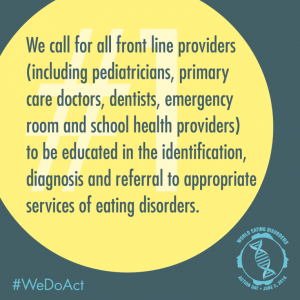I think most of us visualise the clearly malnourished young woman, when we think of eating disorders however, while anorexia nervosa is something to be on the watch for, our patients are presenting increasingly with more unusual, atypical patterns of disordered eating, that are easier to miss. Some of you for example, will be familiar with the term ‘orthorexia’ which is an emerging diagnosis characterised by an obsessional approach to only eating those foods deemed by the individual as healthy, ‘pure’, ‘good’. Gluten-, Dairy-, Soy-, Grain-, FODMAP-, Sugar free organic cookie anyone?
Are we likely to see people afflicted with this…absolutely! As practitioners who deal extensively in food and health related behaviours we are really sitting in the hot seat when it comes to eating disorders – likely to see more of these clients than many other practitioners and also walking a fine line when giving restrictive dietary advice to patients, so as not to trigger this sort of unhealthy thinking.
You may have also recently heard about a new Australian study identifying yet another new eating disorder they are calling, ‘Drunkorexia’ which refers to the increasing trend of young females who restrict their food intake in order to compensate for the kJ intake of alcohol. Put another way, they basically don’t eat on the days they drink, in order to maximise the intoxication effect and minimise or avoid any related weight gain. I have seen this trend in my own 20-30 something patients and when young women do this routinely several nights a week, the nutritional & health consequences, not to mention, the aberrant mindset behind the behaviour is alarming.
So eating disorders, which are highly prevalent and increasing, are walking into our clinics in different shapes and forms…are we able to recognise each one and respond in a constructive way for these patients? I know I’ve been uncertain and experienced dilemnas with some of my clients. What about my mature female client with a BMI of 17, who insists she can’t eat any solid food due to severe gastric irritation, in spite of numerous scopes and investigations which are all clear? Do I consider the possibility she actually has an eating disorder or run the risk of being just another practitioner in a long long list she’s seen who has not called it? If I don’t, I continue to perpetuate her misbelief that there is another explanation, that her food restriction is appropriate, even healthy.
Eating disorders have the highest mortality rate of ANY mental illness, yet many go untreated despite research showing increasingly positive results in terms of treatment options. They are serious, treatable illnesses that result from a complex interplay of genetics, biology and environment and the research suggests that overwhelmingly we are missing them.
In preparation for our Access the Experts webinar series, I have been discussing exactly this topic with Kate Worsfold (nutritional psychologist). She is passionate about improving all health professional’s literacy around this issue so that individuals suffering from disordered eating are identified earlier and receive appropriate treatment faster.
On the 2nd of June it was the very first World Eating Disorders Action Day. The Australia & New Zealand Academy for Eating Disorders (ANZAED) released a message to medical and mental health professionals, parents, educators and general community to impress that we cannot “watch and wait with eating disorders. Getting treatment early gives an individual the best chance of recovery. If there are signs of an eating disorder, refer the person immediately to a qualified medical and/or mental health professional with expertise in eating disorders. Eating disorders affect girls and women, but also increasingly, boys and men. People of all body shapes and sizes and from every cultural background experience eating disorders. A pro-active, whole of community response to helping people affected by eating disorders get the treatment they need will make a real difference to the likelihood of full recovery for each individual.
In light of this recent call for increased awareness and action, it seems very timely that my mental health webinar interview with Kate Worsfold will focus on how to tell the difference between extremely healthy eating, orthorexia or another eating disorder… and then what to do from there. Make sure you know how to identify the mental health illness affecting over 3 million Australians and 400,000 New Zealanders. Kate’s perspective and knowledge of the issues we face as naturopaths and her ability to improve our psychology literacy is fantastic. This topic is relevant to all clinicians – you will not be disappointed.
“Access the Experts with Rachel Arthur” is a webinar series focusing on the best of Mental Health Education. Rachel interviews four hand-picked guest speakers about a particular area of expertise in Mental Health. Each is a clinician with years of experience (from a psychologist to a GP to psychiatrists) who Rachel has worked with and/or been mentored by and she is thrilled that these interviews create an avenue to share their incredible & very practical knowledge with a wider audience. Webinar 3: Kate Worsfold – B.Psych (Hons1), M.Clin Psych (cand.) Post Grad & Adv Dip Nut Med, Adv Dip Nat
“Working on the edge – extremely healthy eating, orthorexia or another eating disorder? How to tell the difference and what to do from there”July 21st at 7pm (AEST)

